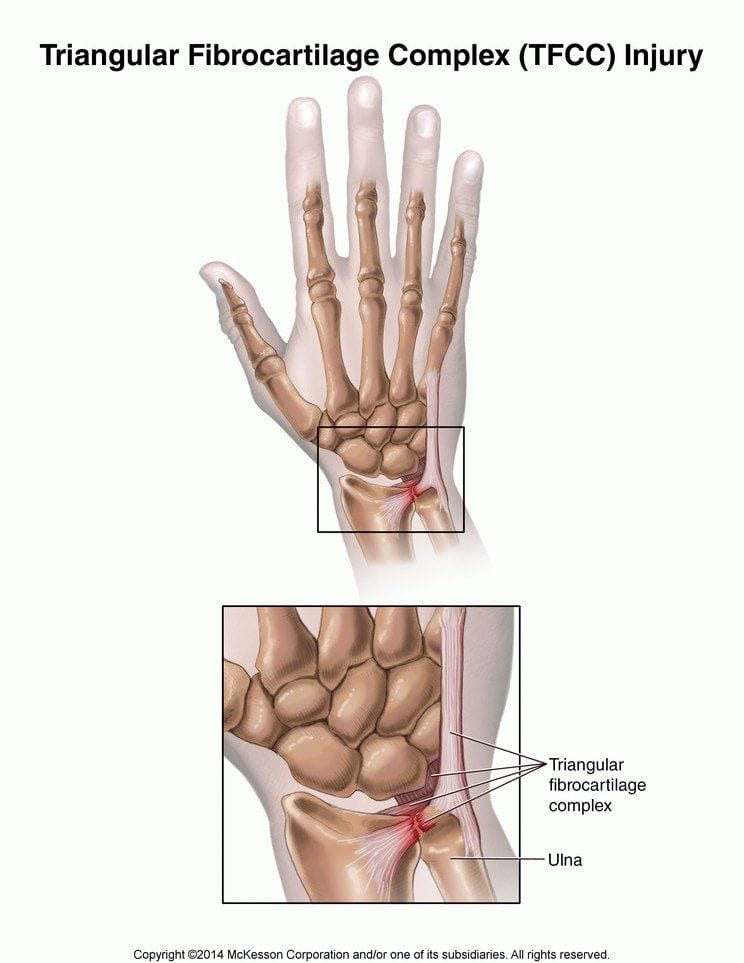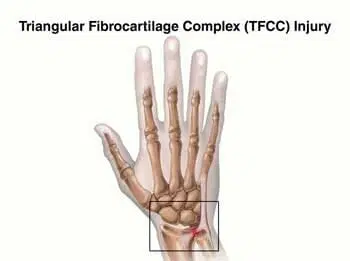The Triangular Fibrocartilage Complex (TFCC) is an essential structure on the small finger side of the wrist that stabilizes movement, absorbs shock, and allows the hand to rotate and grip properly. When injured, the TFCC can cause persistent wrist pain, weakness, and difficulty with daily tasks. At Tran Plastic Surgery in Huntington Beach, CA, we specialize in the diagnosis and surgical or non-surgical treatment of TFCC injuries, helping patients return to normal function with confidence.
What Is the Triangular Fibrocartilage Complex?
The TFCC is a delicate combination of cartilage and ligaments located between the ulna (the smaller forearm bone) and the carpal bones of the wrist. Acting as a cushion and stabilizer, it enables smooth and pain-free wrist motion in multiple directions: bending, twisting, and side-to-side movements.
A tear or injury to this area disrupts stability, often resulting in chronic discomfort. Because the wrist is vital to daily activities and athletic performance, untreated TFCC injuries can significantly impact quality of life.

Causes of Triangular Fibrocartilage Complex (TFCC) Injuries
TFCC injuries can occur suddenly due to trauma or gradually as a result of overuse. Common causes include:
-
Falls on an outstretched hand – One of the most frequent reasons for TFCC tears.
-
Direct blows to the wrist or side of the hand.
-
Sports injuries – Swinging a tennis racket, golf club, or baseball bat places repetitive stress on the TFCC.
-
Violent twisting motions of the wrist.
-
Degeneration over time – With age, cartilage wears down, making tears more likely even with minor stress.
Because symptoms can mimic other wrist conditions, accurate diagnosis is key to selecting the right treatment.
Symptoms of a Triangular Fibrocartilage Complex Injury
The most common signs of a TFCC tear include:
-
Pain on the ulnar (pinky) side of the wrist.
-
Clicking or popping sensations with wrist movement.
-
Weak grip strength or difficulty holding objects.
-
Swelling and tenderness along the wrist joint.
-
Pain when rotating the forearm (turning a doorknob or using a screwdriver).
If you are experiencing these symptoms, early evaluation by a specialist is recommended to prevent long-term wrist instability.
How TFCC Injuries Are Diagnosed
At Tran Plastic Surgery, we take a comprehensive approach to diagnosing TFCC injuries. Our evaluation typically includes:
-
Physical Examination – Assessing pain, range of motion, and stability.
-
X-rays – To rule out fractures or arthritis.
-
MRI or MR Arthrogram – Advanced imaging that provides a detailed view of the cartilage and ligaments.
-
Wrist Arthroscopy – A minimally invasive procedure where a tiny camera is inserted into the joint to view the TFCC directly; this can also serve as the first step toward surgical repair if necessary.
Dr. Tuan Tran, our fellowship-trained plastic and reconstructive surgeon, combines clinical expertise with advanced technology to deliver accurate diagnoses and tailored treatment plans.
Treatment Options for Triangular Fibrocartilage Complex Injuries
Treatment depends on the severity and nature of the tear. At Tran Plastic Surgery, we provide both conservative and surgical solutions:
1. Non-Surgical Treatment
-
Immobilization – A wrist brace, splint, or cast helps stabilize the joint and promote healing.
-
Medications – Anti-inflammatory medications or steroid injections to reduce pain and swelling.
-
Physical Therapy – Customized exercises to restore mobility and strengthen surrounding muscles.
Many mild TFCC tears improve with rest and conservative measures over 8–12 weeks.
2. Surgical Treatment
For patients who do not respond to non-surgical options or have significant tears, surgery may be required. Surgical options include:
-
Arthroscopic Debridement – Removing frayed or damaged tissue to reduce pain.
-
TFCC Repair – Suturing torn ligaments back together for improved stability.
-
Ulnar Shortening or Wafer Procedure – In cases where bone alignment contributes to TFCC injury, surgical reshaping may be recommended.
Our surgical techniques prioritize minimally invasive methods whenever possible, reducing recovery time and optimizing long-term outcomes.
Recovery and Rehabilitation
Healing after a TFCC injury or surgery requires patience and expert guidance. Recovery typically involves:
-
Initial Rest and Protection – Using a splint or brace for several weeks.
-
Ice Therapy – Applying cold packs to control swelling and discomfort.
-
Medication Management – Pain relievers or anti-inflammatory drugs as directed.
-
Rehabilitation – A structured program of stretching, strengthening, and mobility exercises guided by your surgeon and physical therapist.
Most patients experience significant improvement within 8–12 weeks, though complete recovery may take longer depending on the injury’s severity and treatment approach.
Preventing Future Wrist Injuries
While not all TFCC injuries can be prevented, certain steps can reduce risk:
-
Use proper technique in racquet or bat sports.
-
Wear wrist protection during high-risk activities.
-
Strengthen forearm and wrist muscles with regular exercises.
-
Avoid repetitive twisting movements that strain the wrist.
If you are recovering from a TFCC injury, following your surgeon’s guidance is crucial to avoid reinjury.
Why Choose Tran Plastic Surgery?
At Tran Plastic Surgery, we are committed to restoring both function and quality of life for patients with TFCC injuries. Our practice is built on the expertise of Dr. Tuan Tran, whose training in complex reconstructive surgery ensures precision in both diagnosis and treatment.
We also offer specialized care in related hand surgery procedures, including conditions such as Trigger Finger and Thumb Ulnar Collateral Ligament Tear, allowing us to provide comprehensive wrist and hand care under one roof.
Our patients value our compassionate, individualized approach whether they need non-surgical therapies or advanced microsurgical repair.
Schedule Your Consultation
If wrist pain is interfering with your work, hobbies, or daily life, don’t wait. A TFCC injury may worsen without proper treatment. The team at Tran Plastic Surgery in Huntington Beach is here to help you regain strength, motion, and confidence in your wrist.
📞 Call us today at 714-839-8000 or contact us online to schedule your consultation. Let us help you get back to doing the things you love without pain.
*References:
✍️ RelayHealth. (2014). Triangular fibrocartilage complex injury of the wrist. Retrieved from https://www.summitmedicalgroup.com/library/adult_health/sma_triangular_fibrocartilage_complex/

